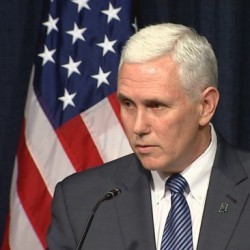Indiana DFS Betting To Go Operational on July 1st

The legality of Daily Fantasy Sports betting has been an ongoing debate since the game rose to prominence in the US, with those supporting the industry opposed to labeling it as gambling, and instead calling it a skill-based game. The distinction between the two terms is crucial due to the legal restrictions it would impose on the industry if DFS betting was categorized as a game of chance, and therefore gambling. In the US, however, the ‘skill v chance‘ battle of legality is slowly gaining ground, first with the state of Virginia having adopted regulation, and now recently in Indiana after Governor Pence (photo) signed a DFS bill into law on the last day of its deadline. The law regulating DFS in Indiana will officially be operative from July 1st 2016.
Sponsored by Sen. Jon Ford
Fantasy sports became a pressing issue in Indiana after it was revealed that as many as 1 million state residents regularly played the game online. As a result, Sen. Jon Ford (R-Terre Haute) felt compelled to pen legislation designed to regulate the industry, and provide a more secure playing environment for Hoosiers. As he explained at the time:
“This is going to allow people that play fantasy sports to know they’re operating on a level playing field.”
Although the bill has now been signed into law by Governor Pence, Ford said that the industry will continue to be studied, and any necessary adjustments will be made going forward.
Key Points of the Indiana DFS Law
– Fantasy Sports will be labelled as games of skill.
-The Indiana Gaming Commission will oversee the industry.
– The licensing fee for operators is $50,000 but could be increased to $75,000 in the future, with renewal costing $5000.
– Amateur contests, such as college football and basketball, cannot be offered by operators.
– The minimum age for playing DFS is 18 and must be verified by the operators.
– The bill has focused on consumer protection by setting up restrictions, such as not allowing DFS operators and their families from playing in the contests. The sites must also have a restrictive functions through which players can restrict their play. Operating funds and the players’ funds must be kept separate. And these sites must go through an annual third-party scrutiny.
The Next Steps
There are several steps have to be put into motion before license applications can be filed and operators can be registered under the law. Firstly, the bill mentions setting up a “Paid Fantasy Sports Division” as part of the Indiana Gaming Commission. This has not yet been established and will require time to set up and start functioning efficiently. Together with the other regulatory methods specified in the bill, it could take several months before operators can start applying for licenses. In the meantime, the state of Indiana has allowed current DFS firms to continue their operations until they receive their licenses, or are denied them according to upholding the standards laid down by the state.
Registration Concerns
Other than the machinery of regulations, there are also concerns over which DFS companies will register for licenses. The high application fee, for instance, is likely to deter many small-time operators from entering the regulated market. In addition, similar concerns that were raised by the Fantasy Sports Trade Association (FTSA) in Virginia are likely to be raised once more in Indiana. It seems that DFS will only be a service provided by big established companies like DraftKings, FanDuel and other operators who can afford the fee. This will probably lead to a monopolization of the sport by big companies.
Despite the concerns mentioned, the bill has been received positively by the industry as it opens up a platform from which to provide their service. These companies now hope to see a similar trend in other states as well.
US Fantasy Sports Regulation
After Indiana signed DFS regulation into law, Griffin Finan, the Director of Public Affairs for DraftKings, made the following statement:
“Today, Indiana became yet another state to put in place a thoughtful and appropriate regulatory framework to protect the rights of fantasy players. We thank Governor Pence for his leadership and advocacy and are hopeful that other states across the country will follow Indiana’s lead.”
The USA’s other major DFS operator, FanDuel, also hailed Indiana’s decision to safeguard the fantasy sports industry, and introduce consumer protection legislation.
Daily fantasy sports betting has fast become a particularly lucrative and popular industry, with around 20 states currently proposing bills to regulate the game.










